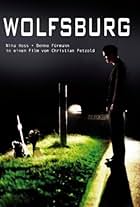I must admit that "Gespenster" by Christian Petzold was a truly deep and unsettling emotional journey. Set in Berlin, the film follows the intertwined stories of Nina and Toni, two young women adrift in the city, searching for something they cannot clearly define. The title, which means "ghosts" in German, could not be more appropriate: the characters are indeed like specters wandering in search of connection, of a sense of belonging. Nina, played by Julia Hummer, is a fragile and silent girl, raised in orphanages and foster homes. Her life is a series of indistinct days, lived in an eternal present without any stable reference point. Her performance is extraordinarily authentic, managing to convey with minimal dialogue an emotional depth that slowly envelops you. Toni, portrayed by Sabine Timoteo, is a elusive and capricious street girl who seems to cling to Nina like an anchor, but at the same time drags her into a whirlwind of uncertainties. The dynamic between the two is complex and charged with tension, a ballet of approaches and withdrawals that reflects their search for identity and belonging. The film is permeated by a cold and alienating atmosphere, reflected in the stark photography and the dark tones that envelop Petzold's portrayal of Berlin. The city becomes a character in its own right, a labyrinth of anonymous streets and faceless buildings that amplifies the sense of disorientation of the protagonists. Petzold's direction is minimal and precise, every shot is designed to underline the sense of emptiness and waiting that pervades the lives of the two girls. There are no emotional outbursts or dramatic climaxes, but a slow build-up of tension that grows until an inevitable breaking point. One of the most powerful themes of the film is the search for one's own identity. Nina and Toni are two lost souls desperately trying to understand who they are and where they belong. This theme is made even more complex by the introduction of Francoise, played by Marianne Basler, a French woman who believes Nina is her daughter who disappeared years before. This subplot adds another layer of mystery and pain, exploring the theme of loss and the desire to rediscover a part of oneself. "Gespenster" is not an easy film, it does not offer simple answers or reassuring conclusions. It is a reflection on alienation and loneliness, an exploration of the pain and hope that accompanies the search for authentic human connection. The soundtrack, with its minimal and atmospheric melodies, contributes to creating a sonic landscape that amplifies the sense of melancholy and anticipation. "Gespenster" is a film that stays with you, that forces you to confront the darkest and most vulnerable parts of your soul. Its strength lies in its honesty and its ability to represent the complexity of human emotions without resorting to easy sentimentality. It is a work that requires attention and introspection, but one that richly rewards those willing to follow it to the end.





















